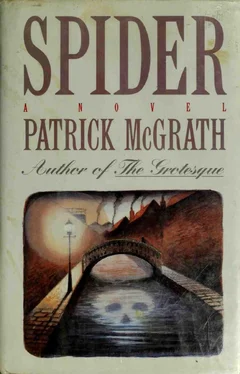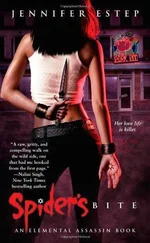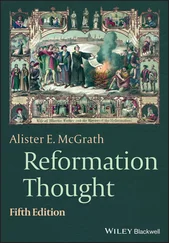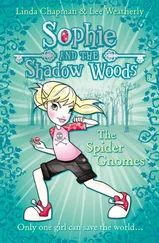I could tell something odd was going on as soon as I entered the kitchen. There was a way (I’d been aware of this before) that Hilda and my father would sometimes watch me from the corners of their eyes, and I could sense them doing it tonight. What used to drive me mad was that as soon as I became conscious of it they’d be looking elsewhere and behaving perfectly normally —too normally—and it was true of that night, there was a strange artificiality to everything they did. There was also a funny smell in the room, though I couldn’t identify what it was. Not the food, I’m sure, for we were having kippers and I know what a kipper smells like. Without a word I took my place at the table; without a word I started on my kipper. I could still feel them glancing at me, and then at each other, though I was never able actually to see them doing it. Then I cut into my potato, and dead in the middle of the halved potato there was a dark stain.
I stared at it with some unease. Then a syrupy fluid began to ooze out of the potato, the thick, slow discharge of what after a moment or two I recognized as blood. I looked up, startled, to see my father and Hilda, their knives and forks poised aloft over their plates, openly grinning at me. The light bulb suddenly crackled overhead and for a moment I thought it was laughter. Again my eyes fell upon the oozing potato, and now the blood appeared to be congealing in a viscous puddle under my kipper.
What did they expect me to do? Something odd was happening to the light in the room; there was only the one bulb, unshaded, dangling from a braided brown cord, and the light it shed was harsh and yellowy. It seemed now to be fluctuating—for some moments to be growing steadily dimmer, until we were all engulfed in shadow, and all I could see of Hilda and my father were the whites of their teeth and eyes, and th e glitter of their eyes—and then it slowly grew brighter again, and they appeared to be behaving perfectly normally. Then with sickening inexorability the light again thickened, and this time the crackling of the bulb grew suddenly very loud, it rose almost to a screech, and as I sat there barely daring to breathe it was impossible not to hear in its crackle voices of derision, and ridicule, and when I looked down at my plate—I was unable to watch Hilda and my father anymore, for they terrified me now, they were transformed, they were like animals of some kind, there was nothing in their faces that I could read as human, and this set the hair on my neck prickling—when I looked down at my plate the blood was faintly glowing, there was a pale incandescence to it, and I stared at it in a state now of frozen shock even as the light slowly came up again and returned the kitchen to that strangely unstable state of false normalcy in which knives and forks clattered on plates and Horace and Hilda ponderously chewed their food and drank their tea and the crackle of the light bulb was once more muted and intermittent, and the tap dripped steadily into the sink. On my plate the halved potato sat in a pool of congealed dripping stained brown by the juices of the kipper.
I would not get up from the table, I would not give them the satisfaction. “I thought you liked kippers,” murmured Hilda, glancing up at me as she brought a freighted forkful to her own mouth, and I saw how my father’s eyes slid toward her at this, and how his lips produced that fleeting twisty twitch of amused contempt, no sooner detected than it disappeared. I wouldn’t give them the satisfaction; wordlessly I sliced into my kipper and began noisily to chew, my eyes now fixed on Hilda’s face. “Whatever are you doing?” she said, picking up her teacup. “There—you’ve swallowed a bone!” I began coughing, for the kipper has a bony skeleton and I had been careless. I brought up onto my plate a damp gob of half-chewed fish with many tiny needle-thin bones embedded in it and sticking out; my father said, “Oh for God’s sake, Dennis.”
Oh for God’s sake, Dennis—can you begin to imagine the fury this aroused in me? Was this not execrable treatment, this vile provocation? But I would not give him the satisfaction, and I held in my feelings, I bottled up my rage and my hatred, for my time would come, this I had known since Christmas, my time would come and then he’d be sorry.
Later they went out to the pub and I went back to my insects. When I heard them returning down the alley I turned off the light and watched them from my window as they came through the gate and into the yard. My father was unsteady, and Hilda was angry with him, this was clear from her unsmiling expression and the way she hurried across the yard and through the back door, while he clumsily closed the gate then made a visit to the outhouse. Footsteps on the stairs—Hilda on her way up to bed. But when, a few moments later, my father came into the house, I did not hear him come up after her, and as the minutes ticked by I realized he had settled himself in the kitchen, even though the light had not been switched on. After a while I tiptoed along the landing and watched Hilda as she slept; her clothes and underwear were draped over a chair, and one stocking had slipped off onto the floor. Then quickly downstairs, and as I’d suspected my father had stayed in the dark kitchen to drink more beer, then passed out. Silently I drew close to him. With his head back and his mouth open, and still in his cap and scarf, he was snoring gently in the chair by the stove, a quart bottle of beer and a half-empty glass on the floor beside him. By the pale gleam of moonlight that came sifting in through the window over the sink I examined him carefully; I still had all my rage bottled up inside me, and I realized I could do to him whatever I wanted; and with the thought came an enormously sweet sense of power, of control.
I opened the bread tin and took out the bread knife. I made a few feints and thrusts with it, imagining how it would be to stick it in my father’s neck. Soundlessly I waved it in front of his face, dancing around like an African boy; he didn’t wake up. The moonlight flashed on the blade of the knife as round and round the kitchen I danced, lifting my knees high and wildly shaking my head, still without making a sound. Tiring of this I put the knife back in the bread tin and filled my palm with stale crumbs. These I then slowly dribbled onto my father’s upturned face, and though he twitched and snorted, and brushed at the crumbs with a jerky hand, still he did not awaken, such was the depth of his stupor.
After the kipper and potato incident Hilda became far less sanguine about me. She decided, I think, that she could no longer tolerate the risk I posed to her newfound security—she had come too far to see it all snatched from her through the wild talk of a boy. For I’d seen the look in her eyes at the table that night, I’d seen the alarm when I’d coughed up a mouthful of bony fish; and with that alarm had come a new, worried watchfulness, I caught it often in the days that followed, she became alert to me in a way she’d never been before. And of course it wasn’t simply the safe berth in number twenty-seven that she stood to lose; if they ever dug up my father’s potato patch, and established that Hilda had been with him that night—then she’d lose a lot more than a safe berth. She’d swing.
And so the atmosphere of number twenty-seven became even more fraught with tension, there was a new edginess, a shortness of temper in both of them that I was quick to exploit. Hilda no longer dispensed teacups of port to Harold and Glad with the same air of merry complicity—no more “just a drop to warm you up, Glad, you’ve had a long night.” No, Hilda was feeling the strain, she was snappy and preoccupied as she went about her tasks in the kitchen. I tried to make things worse. I stole her bucket and took it down the canal, where I filled it with stones and sank it. She was furious about losing her bucket, she searched high and low for it, for of course she couldn’t scrub the floor or the yard or the front doorstep without a bucket. I can see her sitting at the kitchen table when my father came home from work that day (I was listening on the stairs); with a headscarf tied around her hair (all up in curlers) she sipped her tea and said: “I’ve searched high and low—buckets don’t just disappear .” Grunts from my father, and it was hard to interpret them. Was he indifferent to her lost bucket? Or was he knitting his brows, exposing his bottom teeth in that familiar grimace of angry perplexity, and perhaps, at the same time, casting his eyes at the ceiling, up at my room, laying responsibility for the lost bucket at my door? I suspect he was. When I came downstairs for supper Hilda came right out and asked me what I knew about her bucket. I sat in my chair, shrugged my shoulders, gazed at the ceiling and said nothing. “Dennis!” snapped my father. “Answer your mother when she asks you a question.”
Читать дальше












